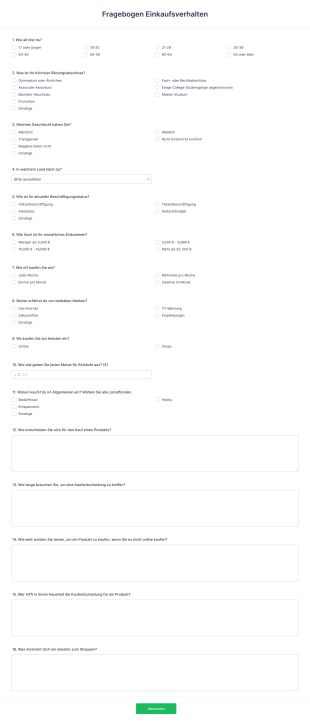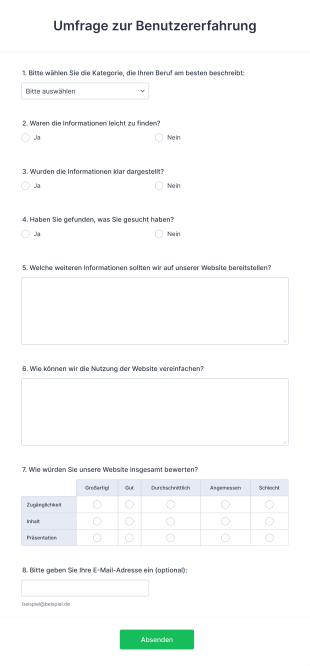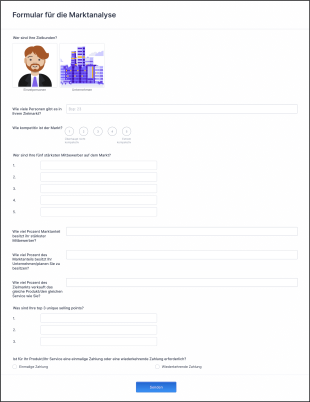Marketingumfragen
Über Marketing Umfragen
Marketingumfragevorlagen sind vorgefertigte Formulare, mit denen Sie wertvolle Erkenntnisse über Ihre Zielgruppe, die Wahrnehmung Ihrer Marke, Produktresonanzen und allgemeine Markttrends gewinnen. Sie erfassen Daten zur Kundenzufriedenheit, Kampagneneffektivität, Markenbekanntheit, Produkteinführungen und mehr. Ob Sie Marktforschung betreiben, Kundentreue messen oder neue Konzepte testen — Marketingumfragevorlagen optimieren den gesamten Umfrageprozess und stellen sicher, dass Sie alle Informationen erhalten, die Sie für fundierte Entscheidungen benötigen.
Passen Sie Marketingvorlagen in Jotform optimal an Ihre Ziele an. Mit dem intuitiven Formulargenerator erstellen Sie per Drag-and-Drop neue Fragen, ändern bestehende Felder und integrieren Analysetools. Akzeptieren Sie Antworten in Echtzeit, ohne technische Vorkenntnisse. Dank des No-Code-Ansatzes kann jeder professionelle Marketingumfragen gestalten. Funktionen wie bedingte Logik, automatische E-Mail-Antworten und nahtloses Datenmanagement helfen Ihnen, Umfragedaten effizient zu erfassen, zu analysieren und gezielt darauf zu reagieren.
Anwendungsfälle für Marketing-Umfragevorlagen
Marketing-Umfragevorlagen können für eine Vielzahl von Szenarien angepasst werden, wobei jede spezifische Herausforderung und Ziele adressiert. Hier erfahren Sie, wie sie eingesetzt werden können, wer davon profitieren kann und wie sich ihre Inhalte unterscheiden können:
1. Mögliche Anwendungsfälle:
- Umfragen zur Kundenzufriedenheit: Messen Sie, wie zufrieden Kunden mit Ihren Produkten oder Dienstleistungen sind.
- Umfragen zur Markenbekanntheit: Bewerten Sie, wie gut Ihre Marke auf dem Markt wahrgenommen wird.
- Produktfeedback-Umfragen: Sammeln Sie Meinungen zu neuen oder bestehenden Produkten, um Verbesserungen anzuleiten.
- Marktforschungsumfragen: Verstehen Sie die Bedürfnisse, Präferenzen und Trends des Marktes, bevor Sie neue Kampagnen starten.
- Umfragen zum Veranstaltungsfeedback: Sammeln Sie die Eindrücke der Teilnehmer nach Marketingveranstaltungen oder Webinaren.
- Umfragen zur Wirksamkeit von Werbekampagnen: Bewerten Sie die Wirkung und Reichweite Ihrer Marketingkampagnen.
2. Lösungsansätze:
- Identifizieren Sie Lücken in der Kundenzufriedenheit und Bereiche mit Verbesserungspotenzial.
- Validieren Sie neue Produktideen, bevor Sie in die Entwicklung investieren.
- Messen Sie die Effektivität von Marketingstrategien und -kampagnen.
- Verstehen Sie die demografischen Daten und Präferenzen Ihrer Zielgruppe für ein gezieltes Marketing.
3. Mögliche Anwender und Nutzer:
- Marketingteams und -manager
- Marktforschungsagenturen
- Produktmanager
- Markenstrategen
- Event Koordinatoren
- Kleinunternehmer
4. Unterschiede in der Erstellung:
- Kundenzufriedenheitsumfragen: Konzentrieren Sie sich auf Bewertungsskalen, offenes Feedback und NPS-Fragen (Net Promoter Score).
- Umfragen zur Markenbekanntheit: Fügen Sie Fragen zur Erinnerung, Wiedererkennung und Wahrnehmung der Marke hinzu.
- Produktfeedback-Umfragen: Verwenden Sie produktspezifische Fragen, Funktionsbewertungen und Verbesserungsvorschläge.
- Marktforschungsumfragen: Beziehen Sie demografische Fragen, Kaufverhalten und Wettbewerbsanalysen mit ein.
- Umfragen zum Feedback zur Veranstaltung: Fragen Sie nach der Logistik der Veranstaltung, der Qualität der Inhalte und dem Gesamteindruck.
Zusammenfassend sind Marketing-Umfragevorlagen vielseitige Tools, die an verschiedene Marketingziele angepasst werden können und Organisationen dabei helfen, datengesteuerte Entscheidungen zu treffen und ihre Strategien zu verbessern.
So erstellen Sie eine Marketing-Umfragevorlage
Die Erstellung einer Marketing-Umfragevorlage mit Jotform ist ein unkomplizierter Prozess, mit dem Sie handlungsrelevante Erkenntnisse sammeln können, die auf Ihre spezifischen Marketingziele zugeschnitten sind. Ob Sie die Kundenzufriedenheit messen, ein neues Produkt testen oder eine aktuelle Kampagne auswerten möchten — die flexible Plattform von Jotform macht es einfach, Ihre Umfrage zu erstellen, zu verteilen und zu analysieren.
Um eine Vorlage für eine Marketingumfrage zu erstellen, gehen Sie wie folgt vor:
1. Beginnen Sie mit der richtigen Grundlage:
- Melden Sie sich bei Ihrem Jotform-Konto an und klicken Sie auf der Seite „Mein Arbeitsbereich“ auf „Erstellen“.
- Wählen Sie „Formular“ und dann entweder „Leer beginnen“ oder „Vorlage verwenden“. Für Marketingumfragen können Sie die umfangreiche Bibliothek mit Marketingumfragevorlagen von Jotform durchsuchen oder Ihre eigene Vorlage von Grund auf neu erstellen.
2. Wählen Sie das entsprechende Layout:
- Entscheiden Sie sich zwischen einem klassischen Formular (alle Fragen auf einer Seite) oder einem Kartenformular (eine Frage pro Seite). Kartenformulare eignen sich ideal für geführte Erlebnisse, während klassische Formulare gut für umfassende Umfragen geeignet sind.
3. Hinzufügen und Anpassen von Formularelementen:
- Klicken Sie auf das Menü „Element hinzufügen“, um Felder, die für den Zweck Ihrer Umfrage relevant sind, per Drag & Drop zu verschieben. Beispiel:
- Kundenzufriedenheit: Verwenden Sie Bewertungsskalen, Multiple-Choice-Fragen und offene Fragen.
- Markenbekanntheit: Umfasst Bildauswahl, Rangfolge und demografische Felder.
- Produkt-Feedback: Fügen Sie produktspezifische Fragen, Feature-Checklisten und Ideen-Boxen hinzu.
- Verwenden Sie bedingte Logik, um Fragen basierend auf vorherigen Antworten ein- oder auszublenden und so ein personalisiertes Erlebnis für jeden Befragten zu gewährleisten.
4. Personalisieren Sie das Design:
- Klicken Sie auf das Symbol Farbroller, um den Formulardesigner aufzurufen.
- Passen Sie Farben, Schriftarten und Designs an Ihre Markenidentität an, damit Ihre Umfrage optisch ansprechend und professionell wirkt.
5. E-Mail-Benachrichtigungen einrichten:
- Konfigurieren Sie im Menü „Einstellungen“ E-Mail-Benachrichtigungen, um Ihr Team über neue Antworten zu informieren, und senden Sie bei Bedarf Bestätigungs-E-Mails an die Teilnehmer.
6. Veröffentlichen und teilen Sie Ihre Umfrage:
- Klicken Sie auf den Tab „Veröffentlichen“, um den Link zu Ihrer Umfrage zu kopieren oder ihn in Ihre Website einzubetten, per E-Mail zu versenden oder über Social Media zu verbreiten.
7. Testen und Veröffentlichen:
- Verwenden Sie die Vorschau-Funktion, um Ihre Umfrage zu testen und sicherzustellen, dass alle Logik und Felder wie vorgesehen funktionieren.
- Senden Sie eine Testantwort und überprüfen Sie, ob die Daten korrekt in Jotform Tabellen gespeichert sind und Benachrichtigungen empfangen werden.
8. Ergebnisse analysieren und umsetzen:
- Greifen Sie auf Antworten in Jotform Tabellen zu, wo Sie Daten filtern, sortieren und zur weiteren Analyse exportieren können.
- Nutzen Sie Erkenntnisse, um Ihre Marketingstrategien zu verfeinern, Produkte zu verbessern oder das Kundenerlebnis zu optimieren.
Mit diesen Schritten können Sie eine Vorlage für eine Marketingumfrage erstellen, die sowohl effektiv als auch auf Ihre individuellen Ziele zugeschnitten ist. So optimieren Sie den Datenerfassungsprozess und stärken Ihre Marketingmaßnahmen.
Häufig gestellte Fragen
1. Was ist eine Vorlage für eine Marketingumfrage?
Eine Marketing-Umfragevorlage ist ein vorgefertigtes Formular zur Erfassung von Feedback, Meinungen und Daten von Kunden oder Zielgruppen, um Marketingstrategien und -entscheidungen zu unterstützen.
2. Warum sind Marketingumfragen für Unternehmen wichtig?
Marketing-Umfragen helfen Unternehmen, Kundenbedürfnisse zu verstehen, Zufriedenheit zu messen, Markenwahrnehmung zu evaluieren und die Effektivität von Marketingkampagnen zu bewerten, was zu fundierteren und erfolgreicheren Strategien führt.
3. Welche Informationen werden in einer Marketingumfrage in der Regel erfasst?
Gängige Daten umfassen Kundenzufriedenheitsbewertungen, Produktfeedback, Markenbekanntheit, demografische Details, Kaufverhalten und Verbesserungsvorschläge.
4. Gibt es verschiedene Arten von Vorlagen für Marketingumfragen?
Ja, es gibt verschiedene Arten wie Kundenzufriedenheitsumfragen, Produktfeedback-Umfragen, Markenbekanntheitsstudien, Marktforschungsumfragen und Veranstaltungsfeedback-Umfragen, die jeweils auf spezifische Ziele ausgerichtet sind.
5. Wer sollte Vorlagen für Marketingumfragen verwenden?
Marketing-Teams, Produktmanager, Geschäftsinhaber, Marktforscher und Event-Koordinatoren können alle von der Verwendung von Marketing-Umfragevorlagen profitieren, um umsetzbare Erkenntnisse zu sammeln.
6. Wie helfen Vorlagen für Marketingumfragen bei der Lösung geschäftlicher Probleme?
Sie identifizieren Verbesserungspotenziale, validieren neue Ideen, messen die Kampagneneffektivität und liefern datengestützte Erkenntnisse für bessere Entscheidungen.
7. Können Vorlagen für Marketingumfragen für verschiedene Branchen angepasst werden?
Selbstverständlich. Vorlagen können an die individuellen Bedürfnisse und Fachbegriffe verschiedener Branchen angepasst werden, um eine relevante und aussagekräftige Datenerfassung sicherzustellen.
8. Werden Antworten auf Marketingumfragen vertraulich behandelt und sicher gespeichert?
Ja, bei der Nutzung von Plattformen wie Jotform werden die Antworten sicher gespeichert und können mit Datenschutzeinstellungen verwaltet werden, um den Datenschutz und die Einhaltung von Vorschriften zu gewährleisten.



















